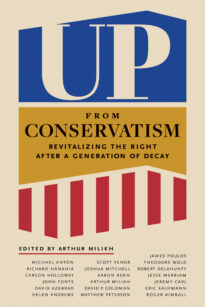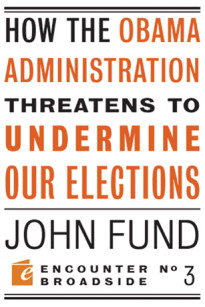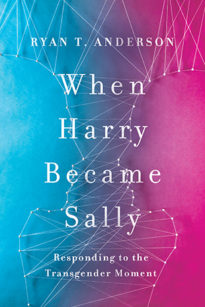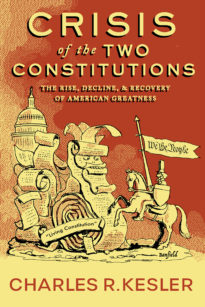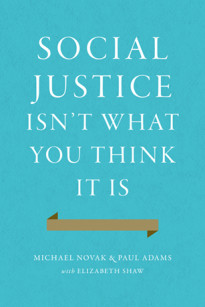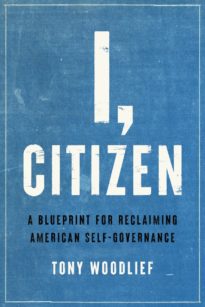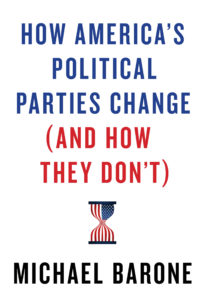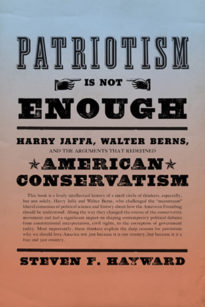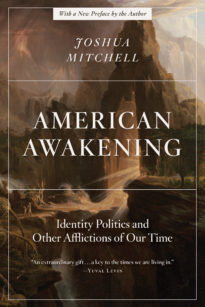America has always been committed to the idea that citizens can work together to build a common world. Today, three afflictions keep us from pursuing that noble ideal. The first and most obvious affliction is identity politics, which seeks to transform America by turning politics into a religious venue of sacrificial offering. For now, the sacrificial scapegoat is the white, heterosexual, man. After he is humiliated and purged, who will be the object of cathartic rage? White women? Black men? Identity politics is the anti-egalitarian spiritual eugenics of our age. It demands that pure and innocent groups ascend, and the stained transgressor groups be purged. The second affliction is that citizens oscillate back and forth, in bipolar fashion, at one moment feeling invincible on their social media platforms and, the next, feeling impotent to face the everyday problems of life without the guidance of experts and global managers. Third, Americans are afflicted by a disease that cannot quite be named, characterized by an addictive hope that they can find cheap shortcuts that bypass the difficult labors of everyday life. Instead of real friendship, we seek social media “friends.” Instead of meals at home, we order “fast food.” Instead of real shopping, we “shop” online. Instead of counting on our families and neighbors to address our problems, we look to the state to take care of us. In its many forms, this disease promises release from our labors, yet impoverishes us all. American Awakening chronicles all of these problems, yet gives us hope for the future.
Free shipping on all orders over $40
American Awakening
Identity Politics and Other Afflictions of Our Time
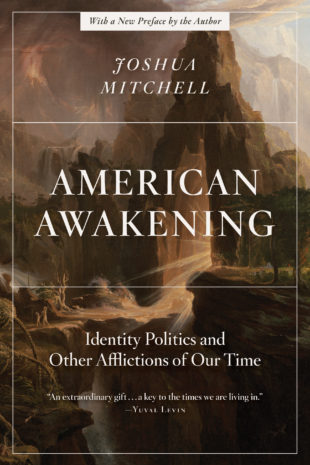
Also Purchase as e-Book
Publication Details
Paperback / 312 pages
ISBN: 9781641771306
Available: 12/13/2022
- Media: Request a Review Copy
- Academia: Request an Exam Copy
About the Author
Joshua Mitchell is professor of political at Georgetown University. The author of numerous journal articles and four books, most recently, Tocqueville in Arabia, Professor Mitchell’s research focuses on Western political philosophy and theology.
Praise
Excerpt
If humanism were right in declaring that man is born to be happy, he would not be born to die. Since his body is doomed to die, his task on earth evidently must be of a more spiritual nature.
The book is about three separable but ultimately related ailments from which we suffer immensely in America today: identity politics, bipolarity, and addiction. Should these three ailments be gathered together in one book? I think they should be, because although identity politics is the more immediate threat, our republic cannot be healthy if we do not also understand and address bipolarity and addiction. The latter two are generally treated as behind-the-scenes psychological or physiological problems about which only trained experts are authorized to write. I have no such authorization. I write as a political philosopher, attentive to what the great authors of the West have written about the human condition; and I write as an observer of, and in, our times. Because of my training, I will consider both bipolarity and addiction in an unorthodox, and I hope, more capacious way than our psychologists and medical experts generally allow. I will look at bipolarity and addiction as existential, political, social, and theological issues that the pharmacology recommended by experts cannot cure. All this, in due course. First, I will make a few observations about identity politics, to give some sense of its contours and of the danger that it poses. Unlike bipolarity and addiction, which seem to belong to our quiet private affairs, identity politics is a very loud public affair. Moreover, it is a loud public affair that is making constructive public life increasingly difficult if not impossible. That is why more than half of American Awakening is concerned with this affliction. To wrestle with the quiet, seemingly private problems we face, we must first take care of the loud public problem. To start our longer journey to recovery, let us start with what is right in front of our nose.
By so many measures, life is getting better all the time. There have been no global wars in the last seven decades. Standards of living have increased nearly everywhere, well beyond anything imaginable at the end of World War II. Many diseases have been eradicated. Starvation is rarer. Drinking water is more readily available. Housing stock has multiplied and modern conveniences have grown exponentially. Travel by every means is safer. International communication is instantaneous and inexpensive. The computing power of a common smartphone exceeds the computing power the astronauts of Apollo 11 had at their disposal during the first manned landing on the moon in 1969.
Alongside the visible material economy that has made these improvements possible lies another economy that is also concerned with weighing and measuring. In this economy, however, we do not weigh and measure empirical things like money, time, and materials. Rather, we seek to measure transgression and innocence—sometimes with a view to the mystery that no balance of payment between them is possible, and sometimes with a view to the demand that all accounts be settled. I will say more about both of these views in a moment. For now, I will say that this invisible economy is uncorrelated with the economic advances we make and, therefore, with the happiness and well-being that is supposed to be ours. Strangely enough, this invisible economy also seems to obtrude all the more as our standard of living increases. Perhaps this is because when we attempt to build a world in which the only things we weigh and measure are money, time, and materials, we momentarily deceive ourselves that this is the only economy in which we are involved. Then, because we can never escape its primordial tug, the invisible economy concerned with weighing and measuring transgression and innocence disrupts and mocks the well-measured world of money, time, and materials that we have constructed, and demands our full attention. Alexis de Tocqueville, the great author of Democracy in America, seemed to think this twofold economy was always going to haunt us. In 1840, he wrote:
The soul has needs that must be satisfied. Whatever pains are taken to distract it from itself, it soon grows bored, restless, and anxious amid the pleasures of the senses. If ever the thoughts of the great majority of mankind came to be concentrated solely on the search for material blessings, one can anticipate that there would be a colossal reaction in the souls of men. They would distractedly launch out into the world of spirits for fear of being held too tightly bound by the body’s fetters.
In the United States, material prosperity was measured and loved more than anywhere else at that time. Because this was the case, there would be periodic and enthusiastic irruptions of the invisible economy. Religious enthusiasm—here understood as the acute awareness of our transgressions, and the frenetic search for the cover of innocence—goes with material opulence. From the vantage point of the material world, as many economists remind us, we should be happier by the day. Because the economy to which they point is not the only one in which we live, we are not happier. Man: the material being who knows the material world is not the only measure of who he is. Furnished with material advances that lift him to unimaginable heights, and haunted by unpaid or unpayable debt from his transgressions, which draw him into wretched darkness from which he cannot escape—that is man.
The twofold economy of ours, the one visible and the other invisible, is quite clearly on display these days, if we know where to look. I mentioned a moment ago that sometimes the invisible economy is understood in light of the mystery that no balance of payment is possible, and sometimes in the light of the belief that a full account can be given and the demand that all accounts be settled. The former understanding is inscribed into Christianity, and the latter is the viewpoint of identity politics. Consider the former first. A mass shooting occurs somewhere in America. Christians offer up their “thoughts and prayers.” They do this because they understand that in the invisible spiritual economy, prayers for the deceased innocents are heard by God—and not just prayers for the recently dead but for the dead of ages past. That is why in the invisible spiritual economy, prayers for the recently deceased are as efficacious as are prayers for African slaves who died on their way to, or on, American soil hundreds of years ago. For those oriented only by the material economy, this is senseless gibberish. A transgression has occurred, and it must be paid for—say, by changing gun laws or, if it were 1865 and we could actually count the cost, by making reparations for slavery. Material suffering requires a material recompense. The balance of payments in the visible economy must be observed. In the invisible spiritual economy, on the contrary, payments never quite balance—at least not in our lifetimes. The innocent suffer, and we do not know why. Good people die, and bad people live. Christian prayer begins and ends with the incontrovertible fact of the imbalance of payments. Innocent people were gunned down. Where were the scales of justice? Innocent slaves died wretched deaths. Where were the scales of justice? The material economy promises much, but because of the incontrovertible fact of the imbalance of payments, the invisible spiritual economy can never be supervened by the visible economy. Money, time, and materials render a portion of our life visibly coherent and manageable, but not all of it. The justice of payment alone does not fully comprehend the world; uncompensated suffering and mercy, too, have their place on the invisible balance sheet of life that only God understands. So declares the Christian. We live within two economies. The one involves payments made and payments received; the other involves something deeper and more impenetrable—an economy within which we are to prayerfully abide, but which we cannot alter. The betrayal of Christ by Judas in the Gospel of Matthew illuminates the collision between these two economies. Judas, the treasurer for the disciples, the one who weighs and measures in the visible economy, is incensed that expensive ointment has been poured out on Jesus’s head. The ointment could have been sold, and the proceeds given to the poor. Jesus replies: “The poor will always be with you”—which is to say there is an invisible economy in which the scales of justice do not balance in the way that Judas wants them to. Concluding that Jesus is not the revolutionary Judas had expected him to be, he betrays Jesus for silver coin, which he presumably wants to use to help balance the scales of justice in the visible economy. For the Christian, try as he may, man cannot resolve the imbalance of payments in the invisible economy. Only God can; and He will not do so until the end of history. A no less remarkable distinction between the two economies occurs at the beginning of the Gospel of Luke: “And it came to pass in those days, that there went out a decree from Caesar Augustus that all the world should be taxed.” Joseph and Mary go to Bethlehem to be counted and taxed—to be included in the bookkeeping of payments that “the world” records. The birth of Jesus does not happen at the Inn, however, but rather in a sheltering place for animals—probably a cave—where Mary lays him in an animal food trough (a manger). He is invisible to the world that payment records; He comes to give relief in the other economy that is beyond price, the economy that man cannot control.

